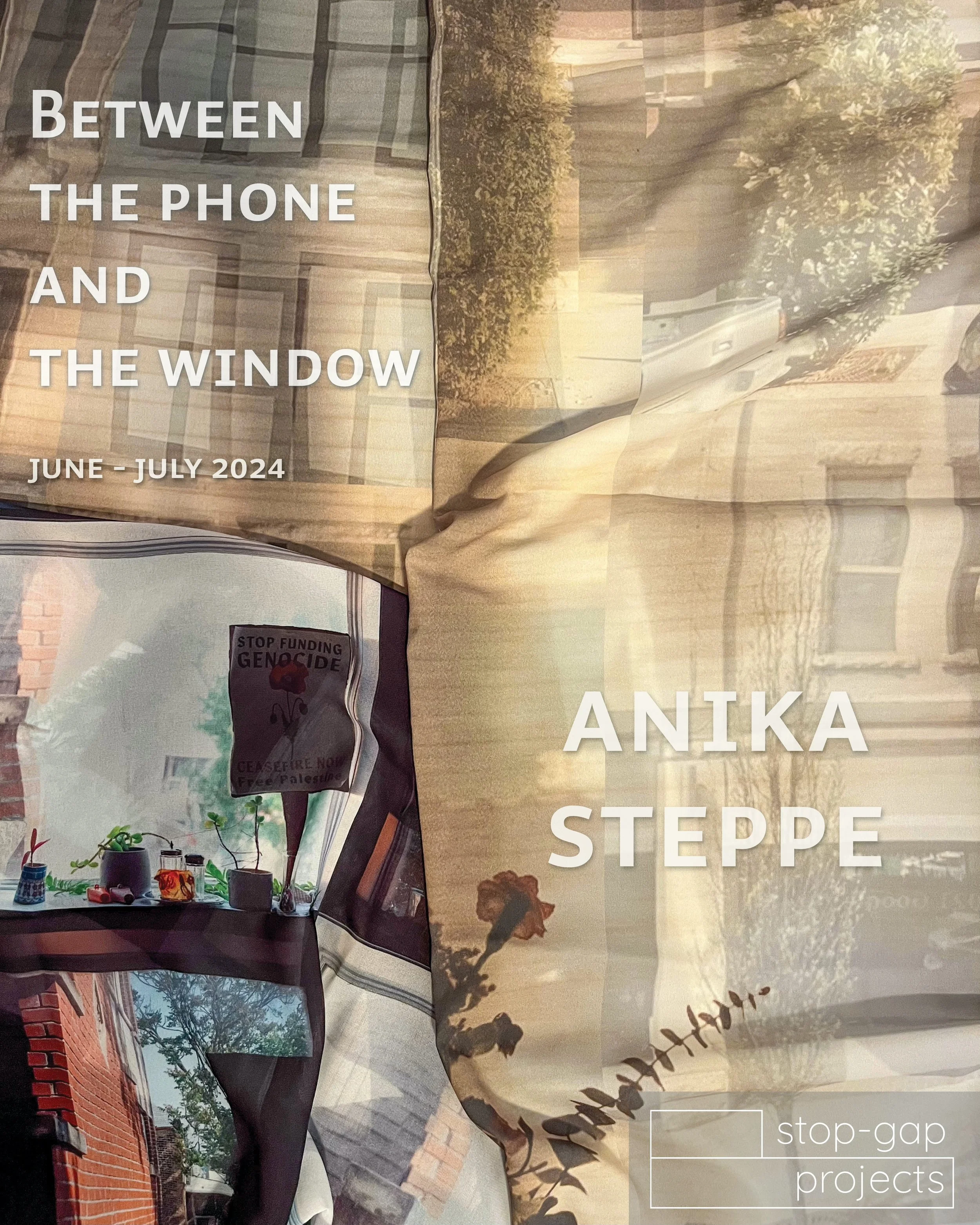This exhibition is part of stop-gap project’s Open Window summer series. Artists were asked to propose projects that could be displayed in the gallery’s street-facing windows and responded to the idea of window space. Anika Steppe’s exhibition will be on display from June-July. As the show is intended to be viewed from the exterior, we will not be having open gallery hours or first Friday receptions during the summer months (although you are welcome to stop by during those times). Instead, we welcome you to view the show at your own convenience—any day and time!
In Anika Steppe’s photo-based work, representations and reflections lie on top of one another, emphasizing the interrelatedness of images as a way of addressing our shifting relationship to the world around us. For her site-specific installation at stop-gap projects, Between the phone and the window, Steppe has created printed curtains that act as both screen and mirror. Combining Google Street View photos of the buildings across from the gallery with photographs Steppe took through the window of her Chicago studio, the curtains’ patterns are at once familiar and distorted. Intended to be viewed through the gallery windows and from the sidewalk, Steppe’s installation considers how photography itself might be like a window: a view into a space that simultaneously reflects what is outside. This meeting of inside and outside is mediated by technology as well as individual history, social connections, and political forces.
In conceiving the installation, Steppe began by researching the surroundings of the gallery. “I became interested in what faced the gallery windows, the things that must have been reflected back at people looking through the windows,” she writes. “In 2008, a very small tree with no leaves sat across the street… By the most recent Google Street View images in 2023, this tree now stood at the height of the building it sits in front of, its leafy abundance reflected in the gallery windows.” Viewers of the installation will see this tree multiplied across the curtains as well as reflected in the windows, creating a kaleidoscope of past and present images documenting the changing site. Since stop-gap projects moved into the storefront at 810 E Walnut Street, it has become a part of this history, succeeding a law firm and a computer repair store. But the gallery also exists in a dispersed social network. While Steppe’s digital collage of divergent views is physically impossible, it nevertheless represents a real relationship across space and time. As if a tree in Columbia could cast a shadow on Chicago bricks, the dappled light sparks a recognition of connectedness as well as displacement.
The title for the show comes from an essay by Eman Abdelhadi titled “Recognition is Solidarity.” In Steppe’s words, “Abdelhadi writes about the dissonance of looking at the devastation in Gaza on her phone and then looking out her window in Chicago and asks, ‘Between the phone and the window, which of the screens should I believe?’” Steppe’s installation asks what our views simultaneously reveal and obscure—not just the views out our windows, but our worldviews, and the views presented to us by others. What makes one view appear real and another false? How does distance aid or impede understanding? Steppe sees photography as a tool that is often used “to come to ‘know’ a place without physically being there.” She shows that this is not just a practical problem, but an aesthetic one, and an ethical one.
Anika Steppe lives and works in Chicago, IL. Within her photo-based work, representations and reflections often lay on top of one another; emphasizing the interrelatedness of images as a way of addressing our shifting relationship to the world around us. She holds an MFA in Studio Art from the University of Texas at Austin and a BS in Cinema & Photography from Ithaca College. Her work has been exhibited most recently in Chicago, New York, and Austin. She has been an artist-in-residence at Interlochen Center for the Arts, Casa Malo, Monson Arts, and Vermont Studio Center. She also works collaboratively with Marta Lee under the moniker Frances Brady.
Eman Abdelhadi is an academic, activist, and artist who writes and thinks at the intersection of identity, politics, sexuality, and gender. She grew up in Columbia, MO and currently lives in Chicago, where she she is an assistant professor at the University of Chicago. You can read her essay “Recognition is Solidarity” here.

